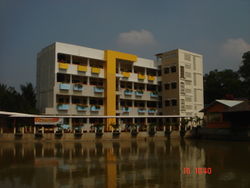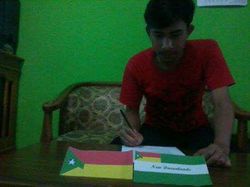History of Indokistan
History of Indokistan are formed by a very long interactions between individuals and groups inside Indokistan or abroad, its timeline starts from 2010. Periods of Indokistani history are divided to:
| Era | Period | Description | ||
|---|---|---|---|---|
| Start date | End date | Duration | ||
| First Republic | 16 September 2010 | December 2010 | 4 months | Establishment and consolidation of Indokistani micronational movement. |
| Socialist Republic | December 2010 | 25 January 2011 | 1 month | Short-lived rule of communist government in Indokistan. |
| Second Republic | 25 January 2011 | 23 August 2012 | 1 year, 7 months | Rise of Indokistani national stability and its foreign affairs, especially inside MicroWiki and Indonesian sector. |
| Emergency Government | 23 August 2012 | 16 September 2012 | 24 days | Establishment of emergency government as result of inactivity and failure of government offices. |
| First Federation | 16 September 2012 | 3 October 2012 | 17 days | Establishment of short-lived Federal Republic resulted from unification of Indokistan, Al Rasyid Darussalam, and Bobodolands |
| Third Republic | 3 October 2012 | January 2013 | 3 months | Restoration of unitary republic and departure of Al Rasyid Darussalam, led to instability. |
| Provisional Government | January 2013 | 5 July 2013 | 7 months | Reform taken to stablise the country after periods of turbulence, arrival of Rayhan Haikal and Raflesinesia to Indokistan. |
| Second Federal | 5 July 2013 | 5 July 2016 | 3 years | Consolidation of Indokistani states that successfully brings stability inside the country. |
First Indokistani Republic

Prior to its establishment, Indokistan has a predecessor, which is named "Indostan", actually a name for Indian peninsula, it is to be prepared as a monarchy state. The father founders - Farhan Abbas, Dicky L. K., and Mustafa Hakim - later agreed to dropped the monarchy state and instead, change it with a democratic republic named Indokistan, a name coined by Farhan in 16 September. The independence proclamation then created shortly after. Writen by Mustafa Hakim, it was signed by Farhan Abbas and Dicky L. K..
Under meritocratic basis, Farhan was appointed as first president, Dicky as vice president, and Mustafa as prime minister. Since the establishment, Indokistan was gradually grown to be a more firm nation, as its political organisations are established, and number of citizens are growing gradually. On its peak, Indokistan has 5 political parties and already held parliamentary election for the first time.
Socialist Republic
On December 2012, the strongest party in the government, Communist Party of Indokistan, plotting a coup against Farhan, which is success as Farhan successfully overthrowned by the "communist army". The communists later establishing the short-lived Socialist Republic of Indokistan.
The existence of this government was unrecognised heavily by pro-democracy citizens, and the government is uneasy in facing oppositions. Criticisms flowed from every sides in Indokistan, even from communists itself removing their support from the government, saying that the government is totally fail, and its fail in executing a genuine communism.
January Revolution
One month since the establishment of the communist government, a group of citizens calling themself Revolutionaries plotted an action of counter-coup and reinstalling the democratic government under Farhan Abbas. They also planned an attack against the communist president, but ended in failure, as they successfully detained, and made no harm to their target.
Deemed as brave action that successfully representing Indokistani citizens feeling against the government, citizens of Indokistan showing their support on the detained Revolutionaries. Citizens later joined the revolutionaries on executing a mass demonstration, which ends in riot and successfully overthrown the communist president, ending the Socialist Republic of Indokistan.
Second Indokistani Republic

After the collapse of Socialist Republic of Indokistan, Indokistan enters an era which majority of its citizens considered it as a "Golden era" of the country. At that period, Indokistani citizens grows more than 100% compared from previous number and after decision from Farhan Abbas, Indokistani mainland was divided into 3 cities: Jumstraad, Flastraad and Trastraad.
Besides of national development, the Golden era was named such because of rise in Indokistani foreign affairs activity. Indokistan for the first time enters the world micronational community, by joining MicroWiki community on February 2011. Los Bay Petros became the first country to recognize Indokistan, and Indokistan was accepted as member of OAM in March 2012.
The period witnessed the first presidential election in the history of the country, with Dicky L. K. victory in election set in 13 September. He was inaugurated in Bolshoiskii Building three days later, as new hope for greater Indokistan arose. In November 2011, Indokistan ratified its first constitution after 15 parliament members signed a petition asked the parliament to do so, and was amended once in January 2012.
Regional conflicts
- See also: Indokistan-Ntolian War, Nameless Betrayal, and Indokistan-Nameless confrontation

Indokistan, became the only large-scale micronational project in the region that attract much support and attention, had its first rival appeared in April 2011. The first rival, Ntolia, suddenly declares war against Indokistan in 6 April without giving any reason after declaring their establishment. As the war with Ntolia ensues since 6 April, another micronation, Nameless, was established and causing a diplomatic rift, as Nameless establisment causing four Indokistani ministers to defect in 24 April. An invasion against the capital Jumstraad in 7 April, was successfully repealed despite that the troops was overwhelmed by Ntolian invaders - this episode of the war was later immortalised by the citizens, proud of Indokistani might and power to repeal foreign invaders.
As Indokistan finally signed a diplomatic treaty with Nameless in early May 2011, the war with Ntolia also ends after a peace treaty was signed in 9 May. Despite on this, Indokistani society was divided on how the country should treat their two neigbours. War veterans preferring Ntolia more than Nameless, arguing while Ntolia already showed their committment on a friendship, Nameless remains a country that should never be fully trusted. Some citizens, preferring Nameless more than Ntolia, saying that Nameless should receives protection rather than confrontation, while Ntolia was already self-sufficient and should not receives any special treatment.
Relations between those two neigbours again worsen, after Ntolian armies caught illegally crosses Indokistani border in August 2011 and causes a skirmishes, and Indokistani government dominated by pro-Ntolian citizens declares state of confrontation against Nameless at almost the same time. Indokistani citizens, agitated by president Farhan Abbas that realized a confrontation would be failed and meaningless, orders war veteran Mustafa Hakim to immediately ends the confrontation and restore diplomatic relations in 20 August, that was succeeded despite of heated argument between both of them beforehand.
Establishment of Indonovia
A letter sent by Harry Fitzpatrick concerning about his proposal to joins Indokistan are finally ends in approval after several discussions in the Bolshoiskii Parliament. After conversations on Skype, both Indokistan and Monovian side are agree to establish an union - later decided to be changed into a confederacy - called Indonovia on 2 April.
Indonovian government are initially prepared the foundation for the formal declaration of establishment of Indonovia that planned to be occured on 28 April 2012, but in the middle of the process of the transitional government, Monovia finally declared that they will join Renasia as Special Administrative Division. This change resulting in uncertainty of the project, since Harry Fitzpatrick as one of the founders left Indonovia. After the departure of Fitzpatrick, all states that joined the confederation lost their interest to continue the project, and later abandoned it. The formal establishment on March 28 was never coming true, as before that, lots of the preparations were failed to be finished, when the state members has gradually leaving Indonovia.
Emergency Government Era
After the departure of the Bobodolands Barakstan, Indokistan has suffer a longer inactivity, lots of governmental offices failed to restoring the functioning of those offices. Finally, on the mid of August 2012, the dying Indokistani government, declaring the establishment of the Emergency Government of Indokistan, ends the entire service of the previous Indokistani government that has failed on restoring the activity.
After few weeks the emergency government were running, Kingdom of Al Rasyid Darussalam states that the kingdom has interest to joining Indokistan, and form the new Indokistani government. The emergency government highly appreciate the offering, as the discussion for the merging were starts immdiately. Republic of Bobodolands that heard about the plan soon asking to join and merge with Indokistan. All parties agreed to unite and form a new federal Indokistan. The emergency government officially dissolved as the establishment of the federal republic occured.
First Federal Era
After the dissolution of the Emergency Government, the newly-united states finally agreed to form a new, federal Indokistan, called Federal Republic of Indokistan and was officially announced on 16 September 2012. A Federal Council took place as the collective head of state and government, was a compromise to guarantee equal power between constituent republics.
Unfortunately, the Federal government does not had good reception as expected, because many citizens unable to receive and adapt to the new federal system. Head of Parliament Tian Abdurrahman, as the most notable opponent for the federation, demanded a restoration of unitary Indokistan.
As motion to return to unitary Indokistan successfully passed inside the Federal Senate, the Federal Republic was dissolved on 3 October, replaced with the unitary Republic of Indokistan.
Third Republic Era
Restoration of the unitary republic has started the third Republic of Indokistan in October 2012. The government still try to boost the activities inside Indokistan and restoring all of its activities.
Not long after the establishment of the Third Republic, President Abdul Rasyid I declared war against Wenang State after several provocations of Wenang against Indokistan by moving border marks inside Indokistan on 3 October 2012. The war was officially ended after Wenang leader arrested by Indokistani troops entering Wenang territory in 8 October.
On December 2012, dissidents from Al Rasyid Darussalam Royal Council - an advisory council for Abdul Rasyid I as the king of the region - in Indokistani provinces of Bandar Rasyidin and Bandar Bolaang Mongondow showed their discomfort and dissatisfaction with the central government. They requested Abdul Rasyid I that he should withdraw from Indokistan, and after being ignored by him, threatens a military takeover. Shortly after that, an unilateral referendum that executed later showing that majority of citizens from that regions support the action to leaving Indokistan. The vote, following by desertion of local forces to support Royal Council, forcing Abdul Rasyid I to declare secession of Al Rasyid Darussalam from Indokistan in 18 December. The secession creates instability in Indokistan after the president forced to left.
In the 2013 New Years Eve, relations between regions in Indokistan began to strained, as rumor spread that few more regions will left Indokistan. This critical situation, followed by the departure of Al Rasyid Darrusalam and Abdul Rasyid I's "forced resignation", paved the way to the establishment of a Provisional Government in January 2013, executing political reforms and preparing for presidential election.
Provisional Government Era
After the departure of two Indokistani provinces that formed the Kingdom of Al Rasyid Darussalam, also the forced resignation of Abdul Rasyid I, instability occured again as Indokistan has no leader to controlling Indokistan. It was later decided by Mustafa Hakim to establishing a provisional government, restoring activities in Indokistan, also executing the Indokistani national reform, started from the end of January 2013.
The first stage of reform has been declared, the priority on this first stage are to amend the constitution, changes on governmental system, and the establishment of "Symbols Act".
On early of February 2013, Raflesinesian Republic declaring that they will reunified with Indokistan on February 2,[1] makes a new booster for the reform process and expanding landclaims of Indokistan. Few peoples said that Raflesinesian former province will be equal with Indokistani existing province, as one of the former Raflesinesian province will receive autonomy status.
Shortly after the reunification of Raflesinesia, Bobodolands province was granted by autonomy status, as Indokistani government seen that Bobodolands province need more freedom on regulating their laws and services, as they is the furthest departement from the capital city in the province of Slobodan.
Second Federal Era

Second direct election to appoint new president was held in June 2013, with results announced shortly that Tian Abdurrahman has won the election with a slight margin with his rival Rayhan Haikal. His inauguration was take place in July 5.
Responding in results following referendum held in May 2013, the newly-formed government under Tian Abdurrahman was announced the establishment of a federation called Federal State of Indokistan, thus creating the current state of Indokistan.
On 1 January 2014, Indokistani dependent territory at that time, Sultanate of Aziziyah, issued a decree declaring union with Indokistan, which Indokistani national forum immediately ratified. Aziziyah retains its monarchy and establishing an Islamic characteristics on its activity, unique among secular Indokistan.
The ratification of new constitution and addition of Aziziyah to Indokistan has boost the national spirit. The new constitution also shown the power of direct democracy when the national forum members all successfully contributed on the creation of the new constitution.
Departure of Tian Abdurrahman and Barakstan has creating a mass, yet short period of disorientation due to confusion led after the departure. Barakstan process to become an independent country has sparked a conflict between Indokistan and newly-formed Islamic Republic of Barakstan, which started by unilateral closure of Indokistani embassy in Barakstan which led to revocation from Indokistan on recognition of an independent Barakstan.
In 13 April 2016, Indokistani government established a government simplification program, with aim to reduce inactive institutions. The policy involved the revocation of KistanRupiah status as official currency and dissolution of Indokistan Armed Forces, Indokistan Technology Development Center, and Central Bank of Indokistan. This policy affect the central government, with economy and defence matters no longer supported by central government, but given to the state government.
2014 State leaders meeting
Indokistan governors attended a special meeting on 1 July 2014 in Suwarnakarta, which was became the first time since the establishment of the federal state.[2] On this meeting, all state leaders attended directly to Suwarnakarta, except Aziz Pahlevi of Aziziyah, attended the meeting through online media.
The meeting was first started by city tour and a visit to national museum, before entering the meeting place and started discussion. The discussion taken is about proposed constitutional amendment, and current world situation, especially about the emergence of ISIS as a "false Caliphate". The meeting was ended in the afternoon and closed by a photo session.
Madyaraksa
In August 2014, Indokistan and Los Bay Petrosian government set a committee advocating union between both countries. The committee stopped working after Los Bay Petros suddenly recalled their delegates from the committee in early September 2014, made the continuity of the project uncertain. In February 2015, Los Bay Petrosian status of membership inside Association of Indonesian Micronations was revoked, marking the eventual end of Los Bay Petros influence in Indonesian sector and the fate of the union proposal.
Dissolution

National Forum for the first time discussed the possible dissolution of Indokistan in 17 June 2016, which was concluded that there were no opposition on the possible dissolution. That meeting led into another session, with several members presenting their draft on adjustments needed before the dissolution, and was ratified by Forum members as a decree in 24 June.
With scheduled dissolution set on 5 July, the decree provided two weeks of adjustments period for central state governments to preparing the dissolution. On 26 June, Central Indokistan and Cussex state had already declared their decision to dissolve on 5 July. Suwarnakarta Institute was established on the very next day, and was expected to become Indokistan "socio-cultural successor". On 1 July, Indokistani chairmanship inside Association of Indonesian Micronations was handed over to Arkapore.
As of 6 July, Indokistan was ceased to exist as micronation, with its unfinished task was taken over by Suwarnakarta government, pending their dissolution because of Aziziyah. On 20 July, Aziziyah state, later followed by Suwarnakarta, declared their dissolution. By their dissolution, entire Indokistani micronational movement was ended.